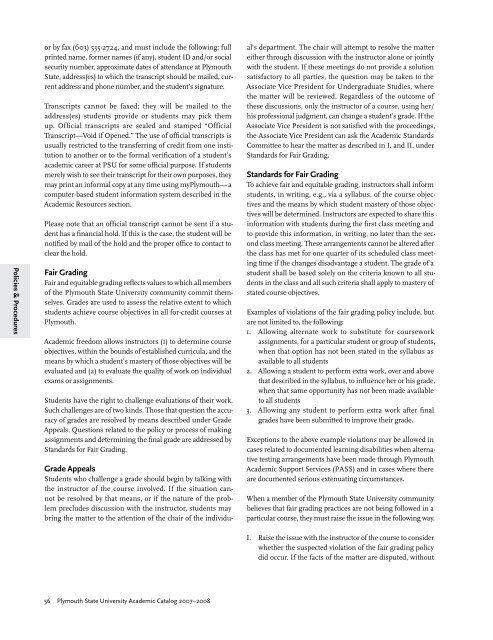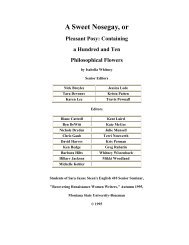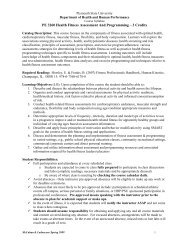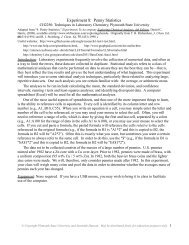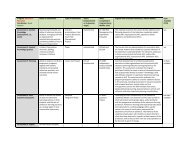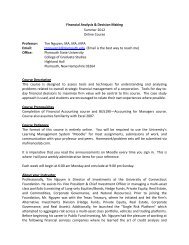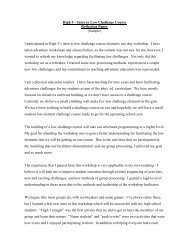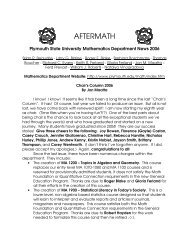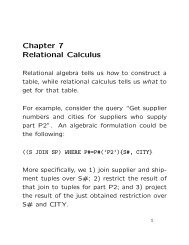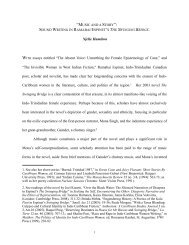2007-2008 Undergraduate Academic Catalog - Plymouth State ...
2007-2008 Undergraduate Academic Catalog - Plymouth State ...
2007-2008 Undergraduate Academic Catalog - Plymouth State ...
- No tags were found...
Create successful ePaper yourself
Turn your PDF publications into a flip-book with our unique Google optimized e-Paper software.
Policies & Proceduresor by fax (603) 535-2724, and must include the following: fullprinted name, former names (if any), student ID and/or socialsecurity number, approximate dates of attendance at <strong>Plymouth</strong><strong>State</strong>, address(es) to which the transcript should be mailed, currentaddress and phone number, and the student’s signature.Transcripts cannot be faxed; they will be mailed to theaddress(es) students provide or students may pick themup. Official transcripts are sealed and stamped “OfficialTranscript—Void if Opened.” The use of official transcripts isusually restricted to the transferring of credit from one institutionto another or to the formal verification of a student’sacademic career at PSU for some official purpose. If studentsmerely wish to see their transcript for their own purposes, theymay print an informal copy at any time using my<strong>Plymouth</strong>— acomputer-based student information system described in the<strong>Academic</strong> Resources section.Please note that an official transcript cannot be sent if a studenthas a financial hold. If this is the case, the student will benotified by mail of the hold and the proper office to contact toclear the hold.Fair GradingFair and equitable grading reflects values to which all membersof the <strong>Plymouth</strong> <strong>State</strong> University community commit themselves.Grades are used to assess the relative extent to whichstudents achieve course objectives in all for-credit courses at<strong>Plymouth</strong>.<strong>Academic</strong> freedom allows instructors (1) to determine courseobjectives, within the bounds of established curricula, and themeans by which a student’s mastery of those objectives will beevaluated and (2) to evaluate the quality of work on individualexams or assignments.Students have the right to challenge evaluations of their work.Such challenges are of two kinds. Those that question the accuracyof grades are resolved by means described under GradeAppeals. Questions related to the policy or process of makingassignments and determining the final grade are addressed byStandards for Fair Grading.Grade AppealsStudents who challenge a grade should begin by talking withthe instructor of the course involved. If the situation cannotbe resolved by that means, or if the nature of the problemprecludes discussion with the instructor, students maybring the matter to the attention of the chair of the individual’sdepartment. The chair will attempt to resolve the mattereither through discussion with the instructor alone or jointlywith the student. If these meetings do not provide a solutionsatisfactory to all parties, the question may be taken to theAssociate Vice President for <strong>Undergraduate</strong> Studies, wherethe matter will be reviewed. Regardless of the outcome ofthese discussions, only the instructor of a course, using her/his professional judgment, can change a student’s grade. If theAssociate Vice President is not satisfied with the proceedings,the Associate Vice President can ask the <strong>Academic</strong> StandardsCommittee to hear the matter as described in I. and II. underStandards for Fair Grading.Standards for Fair GradingTo achieve fair and equitable grading, instructors shall informstudents, in writing, e.g., via a syllabus, of the course objectivesand the means by which student mastery of those objectiveswill be determined. Instructors are expected to share thisinformation with students during the first class meeting andto provide this information, in writing, no later than the secondclass meeting. These arrangements cannot be altered afterthe class has met for one quarter of its scheduled class meetingtime if the changes disadvantage a student. The grade of astudent shall be based solely on the criteria known to all studentsin the class and all such criteria shall apply to mastery ofstated course objectives.Examples of violations of the fair grading policy include, butare not limited to, the following:1. Allowing alternate work to substitute for courseworkassignments, for a particular student or group of students,when that option has not been stated in the syllabus asavailable to all students2. Allowing a student to perform extra work, over and abovethat described in the syllabus, to influence her or his grade,when that same opportunity has not been made availableto all students3. Allowing any student to perform extra work after finalgrades have been submitted to improve their grade.Exceptions to the above example violations may be allowed incases related to documented learning disabilities when alternativetesting arrangements have been made through <strong>Plymouth</strong><strong>Academic</strong> Support Services (PASS) and in cases where thereare documented serious extenuating circumstances.When a member of the <strong>Plymouth</strong> <strong>State</strong> University communitybelieves that fair grading practices are not being followed in aparticular course, they must raise the issue in the following way.I. Raise the issue with the instructor of the course to considerwhether the suspected violation of the fair grading policydid occur. If the facts of the matter are disputed, without56 <strong>Plymouth</strong> <strong>State</strong> University <strong>Academic</strong> <strong>Catalog</strong> <strong>2007</strong>–<strong>2008</strong>


